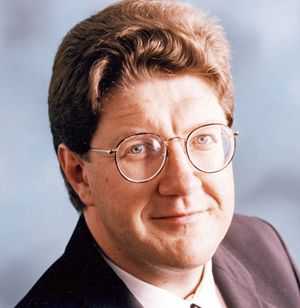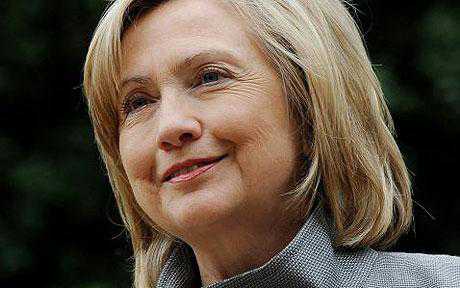Surfing rabbi tells EDL demo ‘We shall prevail’
By Jessica Elgot and Jennifer Lipman
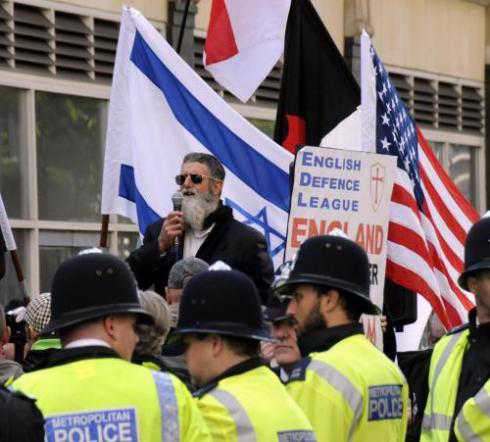
Around 300 members of the far right organisation the English Defence League (EDL) were joined by a US Rabbi associated with the Tea Party at a demonstration “to oppose Islamic fascism”.
Speaking outside the Israeli embassy in London, Rabbi Nachum Shifren stressed he was not here to represent the Tea Party but came as someone “who loves freedom”.
Rabbi Shifren, who is standing for the California state senate, said: “To all my Jewish brothers who have called me a Nazi…I say to them they don’t have the guts to stand up here and take care of business.”
The so-called surfing rabbi said the EDL were the only group in England with moral courage and that politicians would not admit that “because of the Arab petrol dollars.”
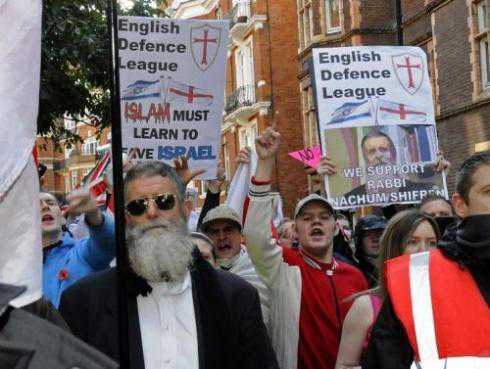
Rabbi Shifren added that Muslims “eat each other alive, like the dogs that they are.”
He said: “We shall prevail, we will not let them take over our countries. We will never surrender to the sword of Islam.”
Shaking his fist in the direction of the Israeli embassy, he shouted slogans in Hebrew, telling the crowd: “You won’t understand what I’m about to say but you will feel my meaning.”
Police surrounded the crowd, who were shouting chants about Allah. A man claiming to be Tommy Robinson, the EDL’s founder and leader, denied that the EDL was a violent organisation.
But he told the JC: “I will protect myself against anyone and I will stand up to anyone and that’s what you’re seeing.
“It will be lads, you will see lads who are not prepared to back down.”
Although the demonstration was ostensibly to show support for Israel, he said he was there to take on militant Islam.
He said: “This isn’t Mickey Mouse, it’s militant Islam. We’re opposing a fascist murdering ideology.”
Mr Robinson, a carpenter from Luton, said that the counter-demonstrators had been “paid to come by this government” and that critics of the EDL “listen to the propaganda.”
Later in the afternoon, the speech of Roberta Moore, leader of the Jewish division of the EDL, was interrupted by an anti-fascist demonstrator who threw water over the public address system.
Hordes of EDL supporters broke ranks to chase the man down Kensington High Street, followed by police. Ms Moore said: “Someone is trying to silence us, so that means our message is sticking.”
After a brief tussle with some anti-fascist demonstrators, several EDL members were searched by police but no arrests were made.
Down the high street around 30 people, from organisations including Unite Against Fascism, Jewdas, and Jews for Justice for Palestinians, as well as two strictly orthodox anti-Zionists, gathered for a counter-demonstration.
Siobhan Schwartzberg, a student from East London and a member of the Socialist Workers Party was one of the organisers. She described the EDL as an Islamophobic and racist organisation and said the demonstration was a marking stone for the group.
“The EDL invited Rabbi Shifren….to use minorities to get at other minorities. We want to say you do not speak for us, you are not a voice for us.”
“This pretence that they are a voice of Jewish people – they want to say that they are an acceptable organisation and they are not.
“They want to be seen to be making clear bigger political ties that don’t exist.”
Yossi Bartal, an Israeli student living in Brighton, added: “It is very important to make clear that there are many Jews and Israelis against the connection they are trying to make.
“The EDL tries to adopt liberal language, but invite Rabbi Shifren, who wants a religious state. It’s funny that this is the one Jew thy have found that will support them.
“They are fascists and not speaking in our name.”
Stephen Shashoua, director of the Three Faiths Forum, said: “The EDL are always trying to divide communities and this as a really low way to do it.
“What we have to seize is Jews, Muslims and others getting together to fight it, either on the streets, in the papers, and across the board, because this is the society we want together, and they don’t represent anything like that.”
, October 25, 2010
Rabbi Shifren’s speech at the EDL demonstration
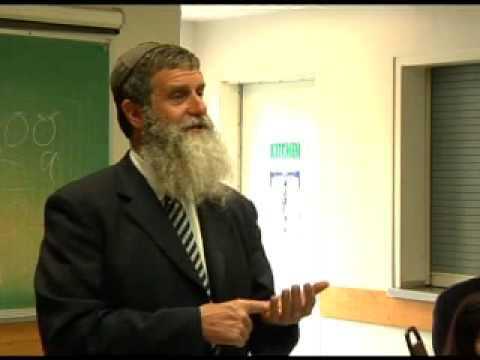 “From the minute I set foot in this country I’ve had nothing but abuse and I tell you now, I welcome every single bit of it.
“From the minute I set foot in this country I’ve had nothing but abuse and I tell you now, I welcome every single bit of it.
To all my Jewish brothers who have called me a Nazi, and have asked why I’m poking my nose into England’s business, I say to them they don’t have the guts to stand up here and take care of business…
“There is only one group in England with moral courage. I wish just one politician had the back bone to stand up and agree, but they’ll never do that because of the Arab petrol dollars…
“In those so-called freedom centres, they plot to destroy and kill us. We’re still waiting for the Muslims to make peace with each other. They eat each other alive, like the dogs that they are…
“I’m looking at this crowd of people here in the UK, and I can see Christians, Hindus, Sikhs and yes, even Jews too. We wanted to say to all those liberals who preach multiculturalism why don’t you go to Saudi Arabia and start there…
“I will not stand by and watch the destruction of both of our countries from within…
History will be recorded that on this day, read by our children for eternity, one group lit the spark to liberate us from the oppressors of our two governments and the leftist, fifth column, quisling press, and that it was the EDL which started the liberation of England from evil…
“Today is the first day of the rest of your lives. We shall prevail, we will not let them take over our countries. We will never surrender to the sword of Islam…“
, October 25, 2010





